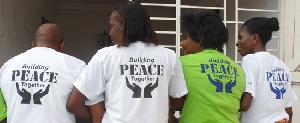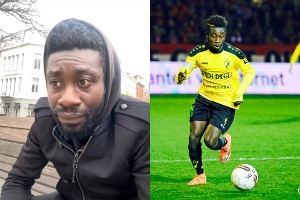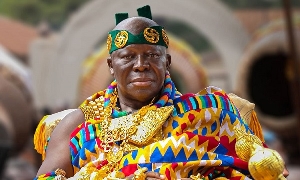- Home - News
- TWI News | TV
- Polls
- Year In Review
- News Archive
- Crime & Punishment
- Politics
- Regional
- Editorial
- Health
- Ghanaians Abroad
- Tabloid
- Africa
- Religion
- Election 2020
- Coronavirus
- News Videos | TV
- Photo Archives
- News Headlines
- Press Release
Opinions of Thursday, 14 July 2016
Columnist: Osei, Nana Yaw
Moving towards a peaceful and violence-free election 2016
Service to humanity and one’s country is not a “do and die” affairs. The communist revolutionary leader of China, Mao Zedong (1893-1976) asserted that politics is a war without bloodshed.
The famous French leader, Napoleon Bonaparte once reportedly said: “in politics, stupidity is not a handicap.” This reveals beyond plausible doubt that whenever there is a competition, there is nothing like fair play.
Politician’s life will be very whimsical without the word “expediency” and some go extra miles to utilize any opportunity at their disposal to score political points.
In his book: Europe since Napoleon, page 4, David Thomson intimated that revolution may begin, as wars often begin, not because people positively want them. They happen because people want other things that, in a set of circumstances, implicate them in revolution or in War.
In Europe for example, the social injustice and administrative ineptitude gave birth to “the revolutionary spirit.” This spirit, a spirit of rationalist criticism and of resistance to the established powers of the Roman Catholic Church, monarchical absolutism, the privileged nobility, was fostered particularly by the work of a remarkable series of French “philosophes.”
A prime example of such philosophes was Jean-Jacques Rousseau (1712-1778). Rousseau best remembered for his famous book “the social contract,” where he remorselessly said, “Men are born free, yet everywhere are in chains,” came out with a theory known as natural inequalities.
According to Rousseau, the only natural inequalities are differences in physical strength, because these are inequalities that arise in the natural state. In modern society, man is corrupted, and the inequalities that result from laws and property are not natural and thus must not be tolerated.
From my novice commonsensical analysis, the 1992 constitution of the republic of Ghana can best be described as the “tyrant of the executive president.” The powers given to the executive president are inimical to the principles of separation of powers and checks and balances as espoused by one of the French philosophes, Baron de Montesquieu.
The executive president is responsible for the appointment of Chief Justices, Inspector-General of the police, Head of the bureau of national investigation, the head of the electoral commission, and the head of the commission on human rights and administrative justice. What is particularly lamentable and nauseating emanate from the fact that 50% of the ministers of state are appointed from parliament.
The opposition members did not only refuse to take part of the constituent assembly that drafted the 1992 constitution but refused to participate in the first parliamentary elections.
In his book, the history of Ghana, page 217, Roger Gocking asserted that many who had voted for the NDC, the NPP’s refusal to participate in the first parliament was very unfortunate, as an effective opposition offered the real possibility that Rawlings would have been forced to “adopt a more conciliatory style of rule” as compared to the PNDC era.
Notwithstanding, the aforesaid assertion on the significance of effective opposition, Professor Adu Boahen, the NPP’s leader, felt that the poor turn out for the parliamentary elections was an ample testimony of the fraudulent nature of the whole elections. Not all NPP members agreed with this position.
The pro-J.A Kufuor faction, though they believed that the election had been fraudulent, still felt that even as a minority in parliament, NPP would help government to conduct its affairs in a responsible manner. Mr. Kufuor would have benefited more from this situation than Professor, Adu Boahen.
He had made an arrangement to stand for election as the MP from his constituency of Atwima in the Ashanti region after he lost the contest with Boahen to lead NPP. Certainly, he would have won this seat and very likely would have emerged as the leader of opposition in parliament. On the contrary, this would have dealt a lethal blow to the presidential ambitions of Adu Boahen.
The boomerang effects of NPP’s anti participatory stands on the parliamentary and constitutional discourse are what we are experiencing now. I believe we shall prevail our challenges and that all stakeholders in the coming elections must stop protracting litigations especially on the electoral commission.
I believe the sovereign will is vested in the electorates and if the voters decide to change, no amount of manipulations would suffice as a solution to the change. The same electoral commission has transferred powers from the running government twice and it is imperative we stop putting pressure on the commission.
The coming election must focus on issues rather than personal vendetta and character assassination. Education, economy, energy, unemployment and health must be our focus. I have personal concerns about high import duties while Ghana is not industrialized. I don’t see the wisdom of putting high taxes on goods we don’t produce in Ghana.
This high taxes have staggered the citizens under serious economic burdens. In his book, “from third world to first world, The Singapore Story: 1965-200,” page 356, the benevolent dictator of Singapore, Lee Kuan Yew, made the following observation about Ghana: “my fears for the people of Ghana were not misplaced. Notwithstanding their rich cocoa plantations, gold mines, and high Volta dam, which could generate enormous amounts of power, Ghana’s economy sank into disrepair and has not recovered the early promise it held out at independence in 1957.”
Definitely, economy, energy, health, education, housing, unemployment must be issues to consider. Political commentators on the radio and journalist must use assertive communication. One of the main features of assertive communication is “I” language. Thus instead of saying: candidate “A” is incompetent, an assertive speaker will say “I disagree with candidate “A” on this issue.”
Instead of saying candidate “B” is divisive an assertive speaker will say I disagree with candidate “B”. If I look at the relationship between President Yoweri Museveni of Uganda and his opponent Dr. Kizza Besigye, we are lucky to have both president Mahamah and Nana Addo as leaders. Let us move toward peace and violent-free elections by embarking on issue-based campaign.
I am intelligent because I know that I know nothing (Socrates). I humbly stand for corrections.
Nana Yaw Osei (Padigo), PhD Candidate. E-mail: padigogoma77@yahoo.co.uk Nana.osei@mail.alfredadler.edu or N_yawosei@hotmail.com











